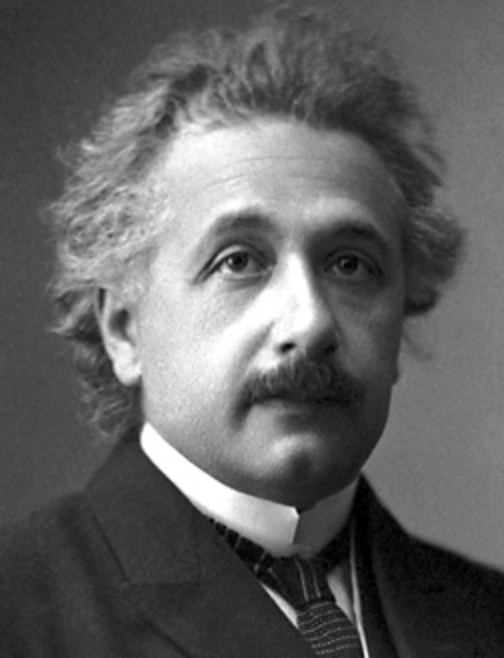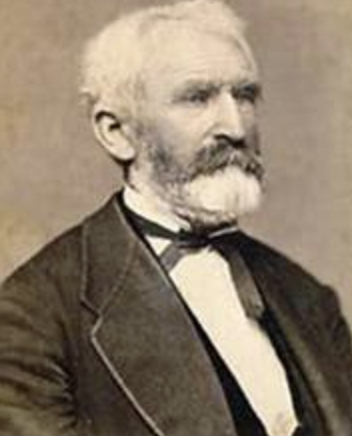March 14
Albert Einstein

On this date in 1879, Albert Einstein was born in Ulm, Germany, to nonobservant Jewish parents. He attended a Catholic school from age 5 to 8. He completed his Ph.D. at the University of Zurich in 1909. His 1905 paper explaining the photo-electric effect — the basis of electronics — earned him the Nobel Prize in 1921. His first paper on Special Relativity Theory, also published in 1905, changed the world.
Einstein split his time and academic appointments between various European universities. After the rise of the Nazi Party, Einstein made Princeton his permanent home, becoming a U.S. citizen in 1940 after moving there in 1933 with his second wife. A pacifist during World War I, he remained a firm proponent of social justice and responsibility. Einstein played a major role in the formation of what would become International Rescue Committee. He chaired the Emergency Committee of Atomic Scientists, which organized to alert the public to the dangers of atomic warfare.
Einstein wrote often about his views on religion and wonder at the cosmic mysteries. Confusion over his beliefs stemmed from such comments as his public statement, reported by United Press on April 25, 1929, that: “I believe in Spinoza’s God, who reveals himself in the orderly harmony in being, not in a God who deals with the facts and actions of men.” Einstein’s famous “God does not play dice with the Universe” metaphor — meaning nature conforms to mathematical law — fueled more confusion.
At a symposium, he advised: “In their struggle for the ethical good, teachers of religion must have the stature to give up the doctrine of a personal God, that is, give up that source of fear and hope which in the past placed such vast power in the hands of priests. In their labors they will have to avail themselves of those forces which are capable of cultivating the Good, the True, and the Beautiful in humanity itself. This is, to be sure a more difficult but an incomparably more worthy task.” (“Science, Philosophy and Religion, A Symposium,” 1941)
In a letter to philosopher Eric Gutkind dated Jan. 3, 1954, Einstein continued to reject the idea of a personal god. Although saying he was proud to be a Jew, he said he was not impressed with Judaism. “The word god is for me nothing more than the expression and product of human weaknesses, the Bible a collection of venerable, but still primitive legends which are nevertheless pretty childish.” In 2018 the “God letter” sold for almost $2.9 million following a four-minute bidding battle at Christie’s.
He married Mileva Marić in 1903 and they had two sons. They had a daughter before marriage whose fate is unclear. She was either given up for adoption or died of scarlet fever. Their son Eduard was diagnosed with schizophrenia at age 20 and spent most of the rest of his life in asylums. After divorcing in 1919, Einstein married Elsa Löwenthal that same year after having a relationship with her since 1912. She was a first cousin maternally and a second cousin paternally. She was diagnosed with heart and kidney problems and died in December 1936.
He died of an abdominal aortic aneurysm in 1955. Pathologist Thomas Stolz Harvey removed his brain without the family’s permission and preserved it in formalin before Einstein was cremated. Harvey later cut the brain into 240 blocks, took tissue samples from each block, mounted them on microscope slides and distributed the slides to some of the world’s top neuropathologists for study.
“Man would indeed be in a poor way if he had to be restrained by fear of punishment and hopes of reward after death. It is therefore easy to see why the churches have always fought science and persecuted its devotees.”
—Einstein column headlined "Religion and Science" (New York Times Magazine, Nov. 9, 1930)
Arnold Krekel

On this date in 1815, Arnold Krekel was born near Langefeld on the Rhine in Prussia. He moved to the United States with his Catholic parents in 1832 and settled in St. Charles County, Missouri. Krekel studied law, was appointed to the bar in 1844 and in 1852 entered the Missouri Legislature. He was one of the original 36 members of the Friends of Religious Enlightenment in 1838. He was also a member of the Association of Rational Christians, also known as the Frei Denkers (Free Thinkers) in 1845.
He married German-born Ida Krug in 1845. They had six children, four of whom survived to adulthood. Krekel became a colonel in the Civil War and presided at the constitutional convention of 1865 in Missouri. President Lincoln appointed him a federal judge. Krekel’s name was one of the last nominations sent to the Senate before Lincoln’s assassination.
A decade after Ida died, Krekel married Mattie Perry in 1880, a well-known “Liberal” (meaning freethinking) lecturer in her own right. He died of Bright’s disease, a kidney ailment, in 1888.
“Although of Catholic antecedents, Judge Krekel was a pronounced Agnostic, and openly expressed his convictions and aided the cause of freethought.”
—"400 Years of Freethought" by Samuel Porter Putnam (1894)
